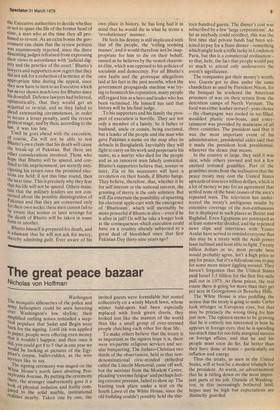The great peace bazaar
Nicholas von Hoffman
Washington The mosquito silhouettes of the police and army helicopters could be seen hovering Over Washington's low skyline; their aniplified rattling noises reminded a seep Cal populace that Sadat and Begin were °ack for the signing. Until ink was applied to Paper, people were offering even money th.at it wouldn't happen; and then once it did, you could get 8 to 5 that in one year we would be looking at pictures of the EgyPtian's corpse, bullet-ridden, as the wire services like to say. The signing ceremony was staged on the White House's north lawn abutting Pennsylvania Avenue. By putting the ceremony !here, the arranger inadvertently gave it a look of physical isolation and frailty compared to the solid marble, institutional realities nearby. Taken one by one, the invited guests were formidable but seated collectively on a windy March lawn, whose winter bald-spots had been especially replaced with fresh green divets, they looked less like the masters of the world than like a small group of over-stressed people clutching each other for dear life.
To make others believe that the treaty is as important as the signers hope it is, there were tri-partite religious services and secular banqueting. The Judaeo-Christian two thirds of the observances, held in that nondenominational civic-minded cathedral called the Lincoln Memorial, came off well, but the minister from the Moslem Centre, pleading 'extreme fatigue' and perhaps feeling extreme pressure, failed to show up. The feasting took place under a tent on the South Lawn of the White House, since the old building couldn't possibly hold the thir teen hundred guests. The dinner's cost was subscribed by a few 'large corporations'. As far as anybody could recollect, this was the first time that private funds had been solicited to pay for a State dinner — something which might look a trifle tacky in London or Paris, but this is a commercial civilisation — so that, hete, the fact that people would pay so much to attend only underscores the event's significance.
The companies got their money's worth, too. Guests 'got to dine under the same chandeliers as used by President Nixon, for the banquet he tendered the American prisoners of war on their return from the detention camps of North Vietnam. The food was either kosher ortrayf— your choice — the champagne was cooled in ice-filled, moulded plastic row-boats, and enter tainment was provided by musicians of all three countries. The president said that it was the most important event of his administration; presidential aides said that it made the president look presidential, whatever the deuce that means.
In the country at large, they said it was nice, while others yawned and not a few emitted irritated grumbles. Part of the grumbles stems from the realisation that the peace treaty may cost the United States upwards of nineteen billion dollars, which is a lot of money to pay for an agreement that settled none of the basic causes of the area's repeated wars. The television has under scored the treaty's ambiguous results by extensive coverage of the non-enthusiasm for it displayed in such places as Beirut and Baghdad. Even Egyptians are portrayed as at least somewhat divided, and the repeated news clips and interviews with Yasser Arafat have served to remind everyone that this may be a treaty with the Arab power least inclined and least able to fight. Twenty billion dollars or so, most people here would probably agree, isn't a high price to pay for peace, but it's a ridiculous one to pay for some more minor jiggling around. They haven't forgotten that the United States paid Israel 3.5 billion for the first five-mile pull out in 1975. At those prices, the real estate there is going for more than they get per acre in Georgetown or Beverley Hills.
The White House is also peddling the notion that the treaty is going to make Carter look stronger in European eyes, but that may be precisely the wrong thing for him just now. The opinion seems to be growing that he is entirely too interested in how he appears in foreign eyes, that he is spending too much time for too little marginal success on foreign affairs, and that he and his people must soon do far, far better than they have done at home — particularly on inflation and energy.
Thus the treaty, as seen in the United States, will at best be a modest triumph for the president. At worst, an advertisement that he is falling down on the most important parts of his job. Outside of Washing ton, in this increasingly bothered land, hopes may be high but expectations are distinctly guarded.






































 Previous page
Previous page